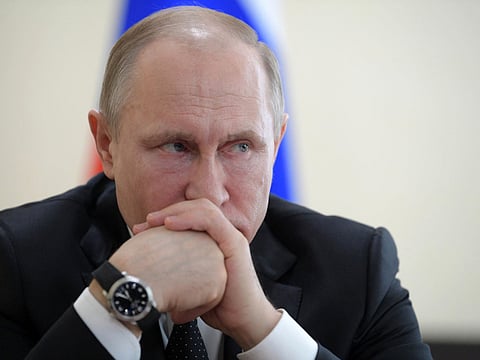Putin flexes his wings in the Middle East and beyond
The Russian president is building further on his policies as he seeks to place Moscow at the centre of the politics in the region

Putin is set to enter the Arab world from its widest doors. His latest presidential win, making it his fourth, and another six-year-term in office, will surely capitalise on the policies he built in the region since Russia decided to intervene in Syria to tip the balance of power in favour of the Bashar Al Assad regime in 2015. Now he will build further on these policies and seek to place Russia at the centre of Middle East politics.
Irrespective of when the war ends, Moscow is almost set to stay in Syria due to various factors including economic ones (entry of Russian oil companies etc). Besides, the “geo-political strategic” prize, gateway to the Middle East” is far too high and with no one to challenge it, Russia will not be prepared to leave Syria any time soon. Let us bear that Putin has been propping up his country to be the next great-power player in the region. He is likely to make this long-term commitment in the light of the perceived American and European weakness, making Putin not one for U-turns. Crimea proved that, and his eye is on Syria and Middle East.
The master KGB-officer-turned-President, in power for 18 years, wants to make Russia great again by rolling the dice. In the first 14 years of his reign, he stayed put, then in 2014 he laid his hand on Crimea, snatching it from Ukraine and regardless of international sanctions, he kept it. A year later, he intervened in Syria despite a global uproar.
Clearly, Putin played his cards right, taking advantage of the “American fatigue” in post-war Iraq that cost it much material and human losses that subsequently led to former United States president Barack Obama’s hands-off approach in the region. With a penchant for risk-taking, Putin decided to take a full-throttle approach and jumped into the Syrian quagmire, seeing it as Russia’s best card to gain long-lost influence in the Middle East. Through Putin’s military alliances and spending, nod-and-wink tactics, political manoeuvring, and of course, brinkmanship, the situation changed in Syria.
He also read the global political situation astutely and took advantage of what was at play, daintily helped by the changing international scenario. It is noteworthy that local, regional and international players are no longer dancing to the tunes of superpowers; they are making their own decisions.
After the Syrian intervention, Putin became more perceptive. With the “security card” in the bag, and through his Foreign Minister Sergei Lavrov, he sought to pursue a more pliable strategy of extending the Russian hand to different players in the Middle East (not through the “carrot-and-stick” approach since Moscow has few financial carrots to dangle), but what can only be called political opportunism. Because of the political quicksands in Syria, Putin got virtually everyone on board including his erstwhile opponent, Turkey, Iran which is practically embedded there, and a trigger-happy Israel.
Plus he tried to “woo” the rest of the Arab world. He is reaching out to Russia’s traditional ally, Egypt, where there is now talk about nuclear cooperation, showing just how far the situation has changed between the two states despite Egypt’s pro-West alignment. Also, Putin extended his friendship to Saudi Arabia in spite of the latest war in Yemen as Russia tried to play a hand in healing the latest rift between Qatar and the Gulf countries.
All this suggests that Putin has never had it so good with regard to Russia’s policy in the Arab world. But the Russian president is a shrewd man, he knows how to make his moves. Right now, the Arab world — with its strategic location, its energy resources and political allies — is very important for Moscow. Putin wants to make gains in the shifting sands; an example of which is Libya, where the situation is still very fluid. Moscow is nonetheless attempting to gain a toehold there.
His final term in office, which has now been extended till 2024, is set to see a series of hectic political manoeuvres in the Arab world and build on the “foreign policy achievements” made in his last term by gaining greater “regional grounds”. His first trip abroad after the election win is surely going to be Sudan, where President Omar Al Bashir has extended an invitation to Putin to visit the country. Russia is a major supplier of arms to Sudan, coupled with growing bilateral and economic cooperation particularly in gold mining. That should point to the direction were Russia wants to go. Surely, Sudan will set the ball rolling to other political adventures in the region while snapping the bud out of the continuing Syria flare-up.
Marwan Asmar is a commentator based in Amman. He has long worked in journalism and has a PhD in Political Science from Leeds University in the UK.



